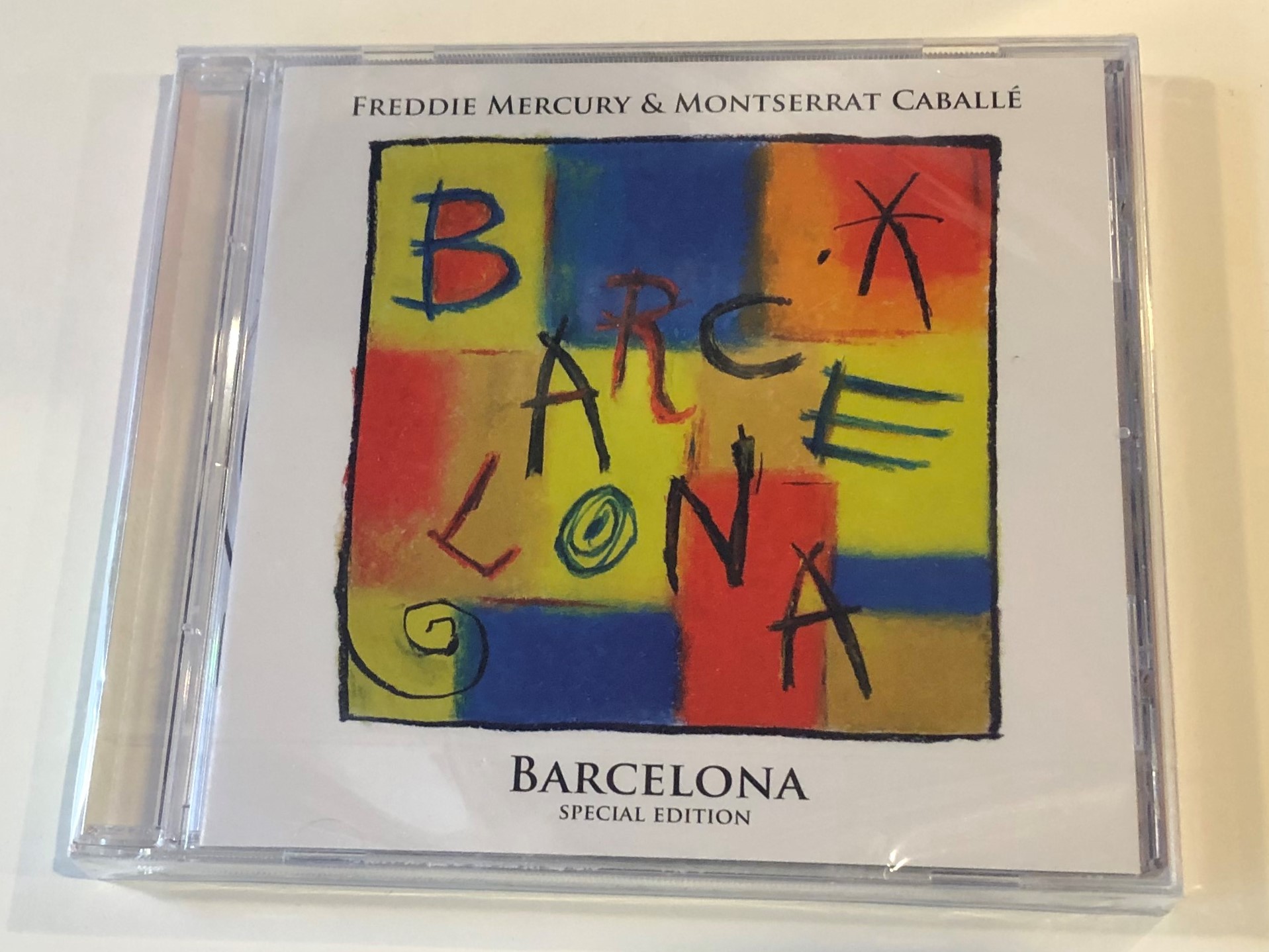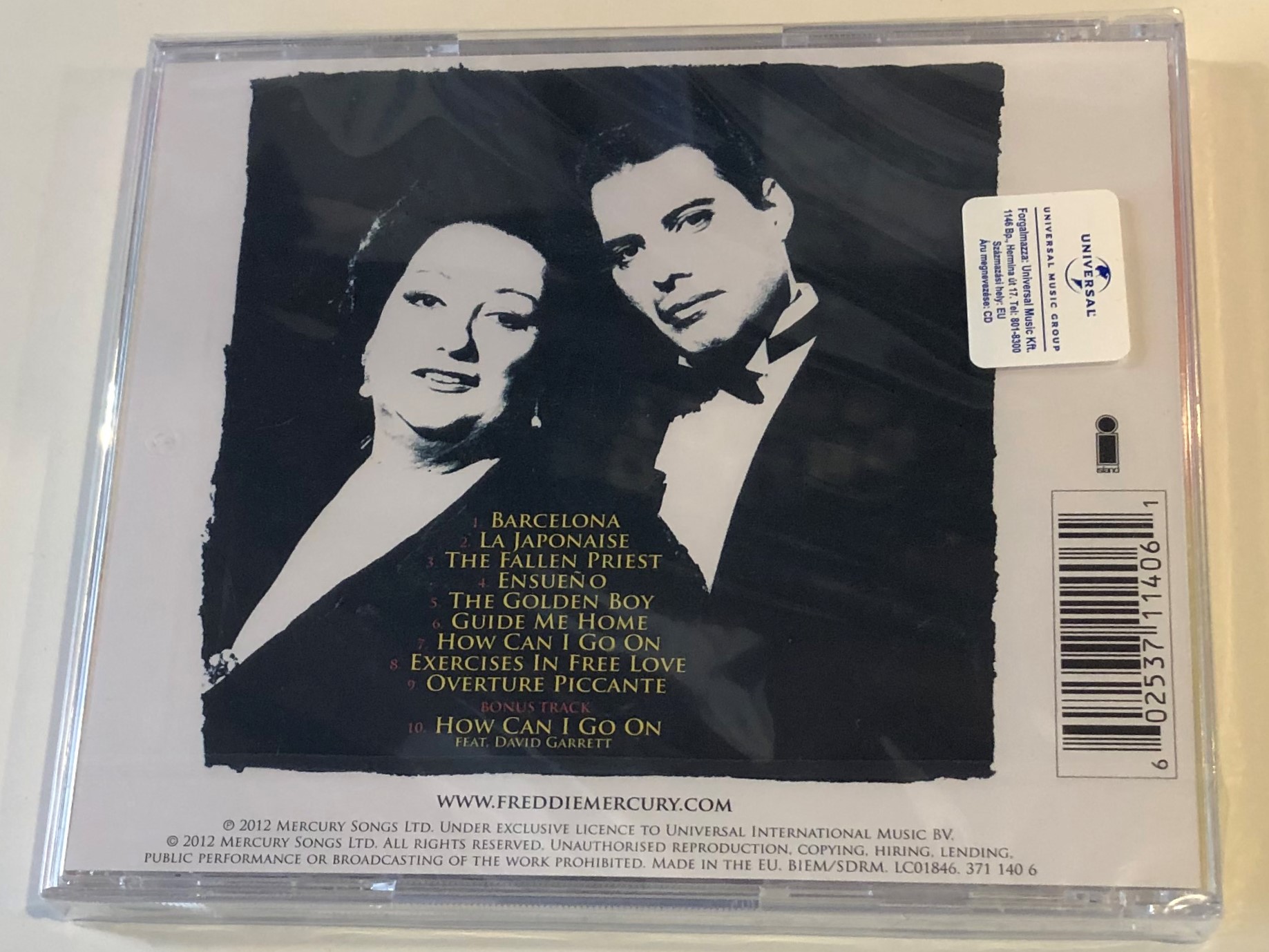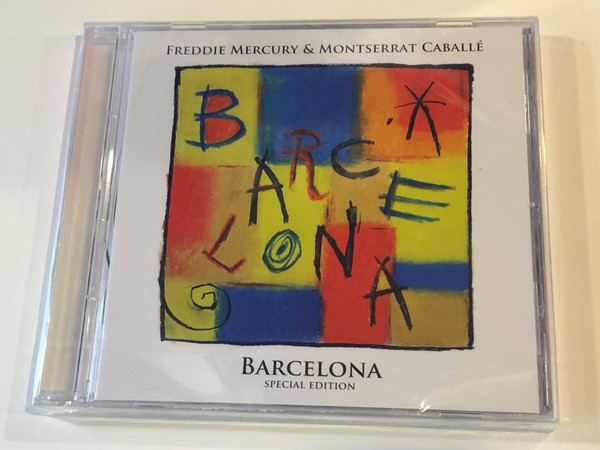Product Overview
Freddie Mercury & Montserrat Caballé – Barcelona (Special Edition) / Mercury Songs Ltd. Audio CD 2012 / 3711406
UPC 602537114061
Product Details:
After Barcelona was selected to be the next Olympic city, Freddie was approached to write a song as a theme for the forthcoming games. The idea was to create a duet with Montserrat, as she is from that city. During the initial meetings, Freddie and Montserrat had developed a respect for each other's music and voices. They soon decided to work on an album together, with Mercury and Mike Moran taking the creative lead as songwriters.
Tracklist:
| 1 | –Freddie Mercury & Montserrat Caballé | Barcelona | |
| 2 | –Freddie Mercury & Montserrat Caballé | La Japonaise | |
| 3 | –Freddie Mercury & Montserrat Caballé | The Fallen Priest | |
| 4 | –Freddie Mercury & Montserrat Caballé | Ensueno | |
| 5 | –Freddie Mercury & Montserrat Caballé | The Golden Boy | |
| 6 | –Freddie Mercury & Montserrat Caballé | Guide Me Home | |
| 7 | –Freddie Mercury & Montserrat Caballé | How Can I Go On | |
| 8 | –Freddie Mercury & Montserrat Caballé | Exercises In Free Love | |
| 9 | –Freddie Mercury & Montserrat Caballé | Overture Piccante | |
|
Bonus Track |
|||
| 10 |
–Freddie Mercury & Montserrat Caballé Feat. David Garrett (4) | How Can I Go On
Featuring [Feat.] – David Garrett (4) |
|
- Orchestrated By – Stuart Morley (2)
About the Artists:
Freddie Mercury (born Farrokh Bulsara; 5 September 1946 – 24 November 1991) was a British singer, songwriter, record producer, and lead vocalist of the rock band Queen. Regarded as one of the greatest lead singers in the history of rock music, he was known for his flamboyant stage persona and four-octave vocal range. Mercury defied the conventions of a rock frontman, with his highly theatrical style influencing the artistic direction of Queen.
Born in 1946 in Zanzibar to Parsi-Indian parents, he attended English-style boarding schools in India from the age of eight and returned to Zanzibar after secondary school. In 1964, his family fled the Zanzibar Revolution, moving to Middlesex, England. Having studied and written music for years, he formed Queen in 1970 with guitarist Brian May and drummer Roger Taylor. Mercury wrote numerous hits for Queen, including "Killer Queen", "Bohemian Rhapsody", "Somebody to Love", "We Are the Champions", "Don't Stop Me Now", and "Crazy Little Thing Called Love". His charismatic stage performances often saw him interact with the audience, as displayed at the 1985 Live Aid concert. He also led a solo career and served as a producer and guest musician for other artists.
Mercury died in 1991 at age 45 due to complications from AIDS. He confirmed the day before his death that he had contracted the disease, having been diagnosed in 1987. Mercury had continued to record with Queen following his diagnosis, and he was posthumously featured on the band’s final album, Made in Heaven (1995). In 1992, his tribute concert was held at Wembley Stadium. His career with Queen was dramatised in the biopic Bohemian Rhapsody (2018).
As a member of Queen, Mercury was posthumously inducted into the Rock and Roll Hall of Fame in 2001, the Songwriters Hall of Fame in 2003, and the UK Music Hall of Fame in 2004. In 1990, he and the other Queen members were awarded the Brit Award for Outstanding Contribution to British Music, and one year after his death Mercury was awarded it individually. In 2005, Queen were awarded an Ivor Novello Award for Outstanding Song Collection from the British Academy of Songwriters, Composers, and Authors. In 2002, Mercury ranked number 58 in the BBC's poll of the 100 Greatest Britons.
María de Montserrat Viviana Concepción Caballé i Folch (12 April 1933 – 6 October 2018) was a Spanish operatic soprano. She sang a wide variety of roles, but is best known as an exponent of the works of Verdi and of the bel canto repertoire, notably the works of Rossini, Bellini, and Donizetti. She was noticed internationally when she stepped in for a performance of Donizetti's Lucrezia Borgia at Carnegie Hall in 1965, and then appeared at leading opera houses. Her voice was described as pure but powerful, with superb control of vocal shadings and exquisite pianissimo.
Caballé became popular to non-classical music audiences in 1987, when she recorded, at the request of the IOC, "Barcelona", a duet with Freddie Mercury, which became an official theme song for the 1992 Olympic Games. She received several international awards and also Grammy Awards for a number of her recordings.










